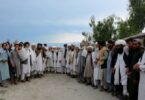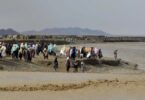Sheikh Fakhar-e-Alam
Afghanistan’s stability is of special importance not only for Afghanistan but also for regional and global players. Pakistan is the linchpin of the future of Afghanistan. Taliban are the biggest reality at the moment. If they are not recognized, it may lead to increased unrest in Afghanistan in particular and the region in general. Not only recognition, Taliban need foreign help to run the day to day affairs. Taliban understand that they cannot run the system alone.
Taliban have to give confidence to the general public that they are not against anyone and every citizen is allowed to live freely and their fundamental rights would be protected, particularly women rights.
90% of Afghanistan’s foreign trade is currently stagnant and an emergency aid of 1 billion USD is urgently needed to run the interim setup. The US, the IMF and World Bank have freeze 10 billion USD of Afghanistan in the foreign reserves. IMF had approved a 450 million USD loan for Afghanistan, but was suspended due to the uncertain situation. International organizations are raising concerns that 70% of Afghanistan’s population will be on the verge of poverty in the next few months. The US has left Afghanistan militarily, but the strings of international financial institutions are still in its hands. Even before the Taliban, foreign aid accounted for 75% of Afghanistan’s annual budget. Various economists are predicting that the Afghan economy may shrink by 20 to 25 % in the next one year.
After the formation of the interim setup, there are fears among various groups about their stake and share in the new setup. In present circumstances, only the participation of all stakeholders in governmental affairs can make Taliban acceptable for all. It is a matter of fact that if Taliban are able to manage and establish their credibility and control on the domestic front, they will certainly be able to adopt a better approach on the regional and global front.
The Taliban interim government is facing major challenges. The first challenge is to form a government that is acceptable in and outside Afghanistan. The second challenge is of recognition by international community. This will help Taliban to connect with the world and view themselves in a larger global framework. The third is their past, they have to prove that they are not the Taliban of the past but of the present and the future. Finally, the support and sanctuaries of terrorist organizations in Afghanistan will remain a constant challenge. Taliban will have to ensure that the Afghan soil will never be used against any third country.
Taliban wants to normalize the relations with all major regional powers including India. Pakistan has presented several dossiers to the global community that India was carrying out terrorist activities inside Pakistan by using the Afghan soil. With Taliban in power, India has lost its uncountable assets, installations and investment in Afghanistan. Apparently, Taliban’s victory seems to be a major failure of Indian foreign policy. Now India has realized that whatever tactics it tries to play for subtracting Pakistan from Afghanistan, will fail. While trying to diminish Pakistan, India has now subtracted itself from Afghanistan’s game and become a victim of global isolation. The recent changes in Afghanistan, on the other hand, have given Pakistan an opportunity to end its political isolation on the world stage.
Few days ago, a conference of intelligence chiefs of seven countries including Pakistan, Russia, China, Iran, Uzbekistan, Turkmenistan and Tajikistan was held in Islamabad in order to discuss the security situation and intelligence cooperation regarding Afghanistan. In the meanwhile, Director General Inter-Services Intelligence, Lieutenant General Faiz Hamid’s visit to Kabul, in particular, received global attention. The opinion makers around the world have linked his visit to removing all obstacles in the formation of an interim government in Kabul. As formal diplomatic links are not established with the new Taliban government by regional countries, the importance of intelligence agencies has increased so much.
It is also true that not a single country in the world, including Pakistan, has yet recognized the new Taliban government in Afghanistan, but many of them have announced their cooperation with them. This is a unique form of diplomacy that on one hand states are refusing to recognize the Taliban government, but on the other hand, many regional and global players are looking for different ways to work with them. The Taliban used to say that the “US has a clock and we have time”, but now the situation has changed as the Taliban have the clock and the US has the time along with the world to sit and think about a reconcilable future of Afghan society under Taliban.
fakharhrp@gmail.com






